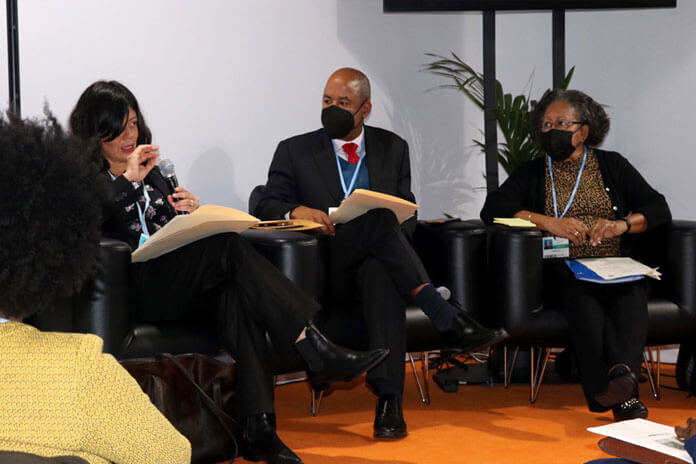BELIZE CITY, Mon. Nov. 8, 2021 — While hundreds of global leaders continue to engage in COP26 negotiations, many have started to fear that the summit will fail to meet the goals that were deemed critical for safeguarding the climate from the most severe effects of climate change. Leaders of more vulnerable territories such as Belize and other Small Island and low-lying Developing States (SIDS) have called upon the G20 to take more extensive action, given their failure to meet the climate-finance goal of USD 100 billion per annum by 2020.
Correspondence coming from the Caribbean Community Climate Change Center (CCCCC) indicates that head CARICOM negotiators are saying the updated UNFCCC Synthesis Report is still projecting an increase in global temperature of 1.5° C or more despite the collective goal of attaining net zero by 2050 by the 140 participant countries. Additionally reports also indicate that neither the USD 100 billion goal nor key provisions of the Paris Agreement will be met by 2023. This has resulted in CARICOM Ministers with responsibility for Climate Change declaring that the region faces a “climate emergency and unavoidable loss and damage.”
CARICOM Ministers and Heads of Delegations at COP26 are therefore expected to “resolve process challenges to land a Glasgow package” that would more aggressively address the challenges facing CARICOM. Further, they are calling for global solidarity to deliver timely action and support for a climate shift in this decade with aims of limiting global warming to well below 1.5° C. In their declaration, those CARICOM leaders noted that the G20 accounts for 75% of greenhouse gas emissions and “have the greatest mitigation potential to curb emissions and keep 1.5° C within reach”. Further, the declaration lists a number of climate factors affecting SIDS, which will continue to experience “worsening of slow onset events and extreme events, including more intense storms, along with heavy or continuous rainfall events, ocean acidification, increased marine heatwaves, rising sea levels together with storm surges resulting in coastal inundation, saltwater intrusion into aquifers and shoreline retreat, as well as the continued overall decline in rainfall, increased aridity, and more severe agricultural and ecological droughts” due to a projected 2.7°C increase in global warming by the end of the century.
This is especially trying for developing Caribbean states in our region who only contribute a mere 0.2% of global greenhouse gases and are bearing crippling costs associated with climate change while being at times ineligible to access grants and assistance funding. These factors have all been made worse by COVID-19, which has redirected many governments’ funding and reduced cash availability to respond to climate-related expenses.
The CARICOM negotiation delegation is therefore calling on the G20 to commit to engaging in a number of key efforts, including closing “the emissions gap in order to maintain global warming to well below 1.5° C; deliver well before the global stock take in 2023” as well as the establishment of new NDCs with 2030 targets that are consistent with the 1.5°C temperature goal and credible net zero by 2050 long-term strategies”. They are also asking these countries to “support efforts to encourage the aviation and shipping sectors to align with the Paris goals; and, provide fair and just compensation for ecosystem services regarding climate and atmospheric regulation” as well as “ensure a green and sustainable approach to the recovery from the COVID-19 pandemic”. Also, on CARICOM’S behalf, they commended fellow Member States who have already submitted ambitious targets and noted encouragingly the efforts of others to finalize their submissions as well as commit to marshal all efforts to present low emission development strategies in line with a net-zero-by-2050 commitment.
The declaration goes at great lengths to list ways in which the international community should support CARICOM members in “optimizing synergies between climate action and COVID-19 responses to ensure a green and sustainable approach to the recovery”. They also list ways in which which developed countries should “close the financial gap and deliver on their goal of at least USD100 billion per annum by 2020, aiming for a balance between mitigation and adaptation, and to progressively scale up finance from the floor of USD100 billion”. These include the submission of a “credible plan for the period 2020 through to 2025, on delivering and going beyond the floor of USD100 billion p.a., that includes a specific target to significantly increase finance for SIDS in accordance with our needs, and modalities for fast-track financing in keeping with the emergency we face,” and ensuring “that all CARICOM Member States are able to access climate finance as grants and other concessionary instruments on affordable terms bearing in mind the lender’s responsibility not to undermine a country’s debt sustainability.” They are also recommending that these countries, “provide dedicated funds additional to the USD100 billion p.a. floor to support the Caribbean and other SIDS in proactively responding to loss and damage already being incurred; support the establishment of a formal replenishment process for the Adaptation Fund; agree to a process for the new climate finance goal to be disaggregated to address: adaptation; mitigation; loss and damage response; just transition; transparency; readiness and enabling activities; and mechanisms supporting capacity building, technology transfer and providing technical assistance to developing countries; a sub-goal for non-state actors; specific attention to the needs and capabilities of Small Island and low-lying Developing States; and, transparency and consistency in reporting, linked to the enhance transparency framework and the implementation and compliance mechanism of the Paris Agreement; and at the regional level, to enhance capitalization of the Caribbean Catastrophe Risk Insurance Facility”.
Given that these very nations are now facing “dangerous anthropogenic climate change” on the frontlines, CARICOM is calling on COP26 leaders to “confront the reality of loss and damage in SIDS and to identify robust options on a way forward for the UNFCCC to deliver action and support that responds to this reality and ensures our survival”, emphasizing that there is “no more time for equivocation and no more time for delay.”

